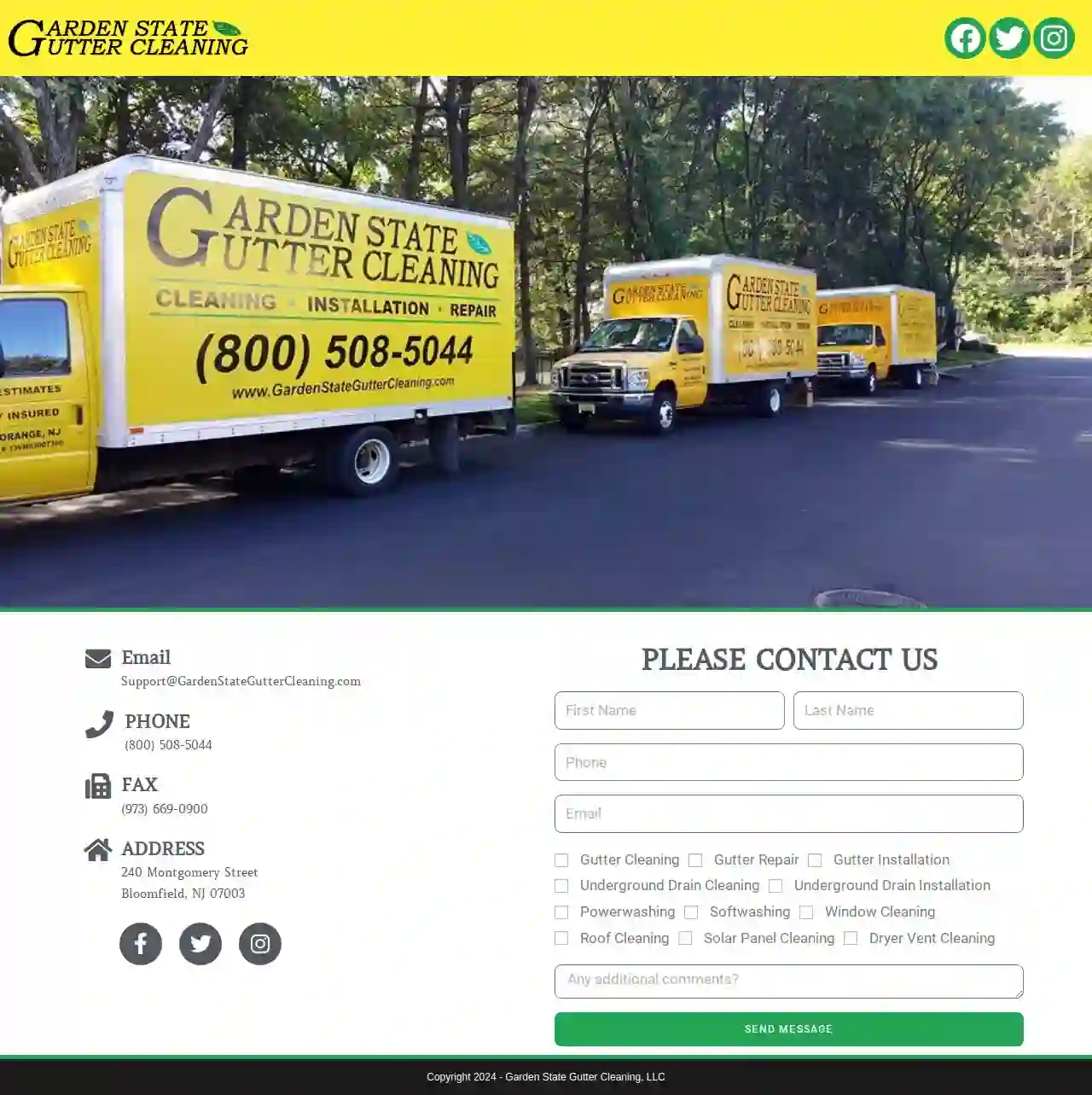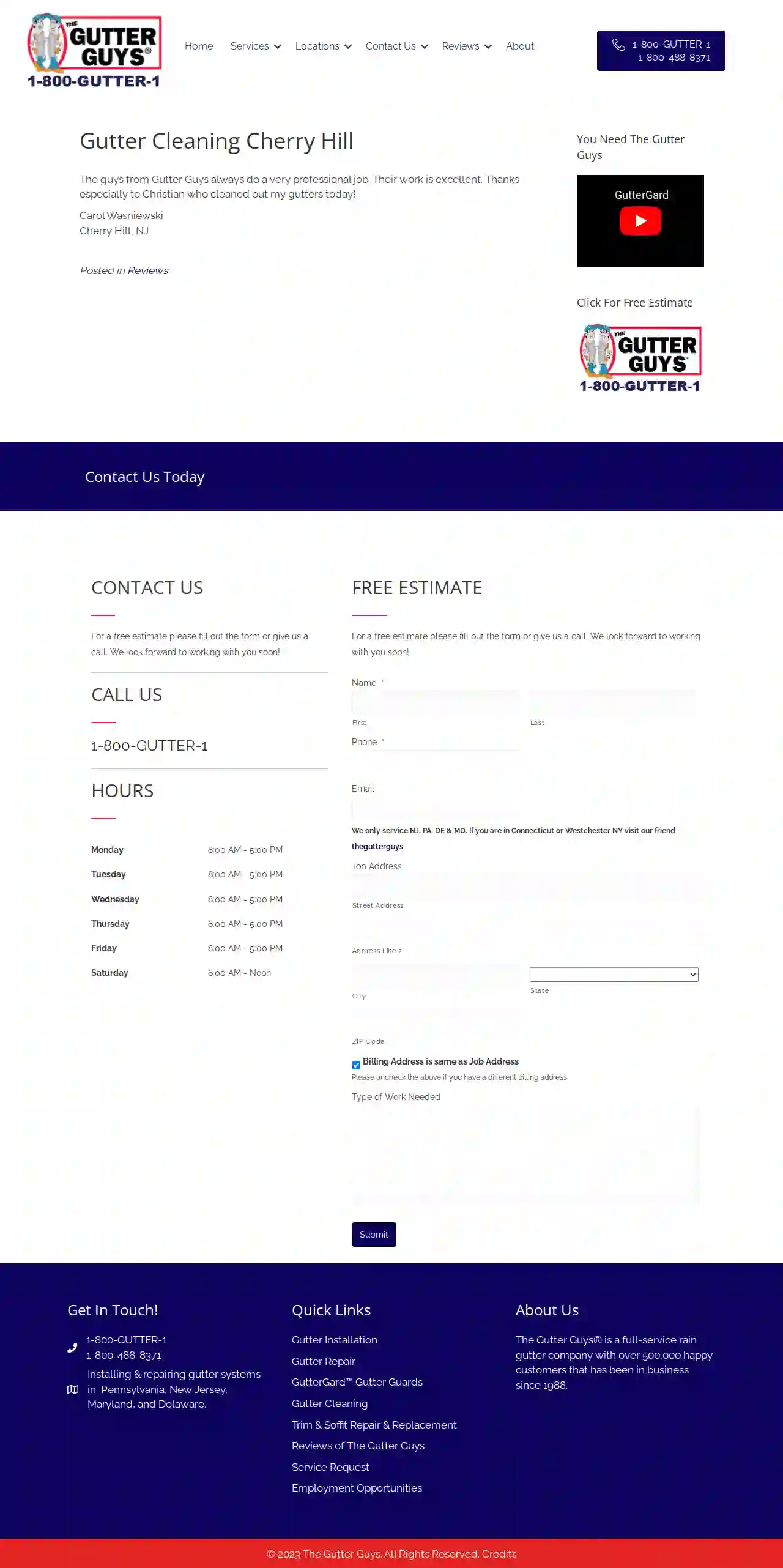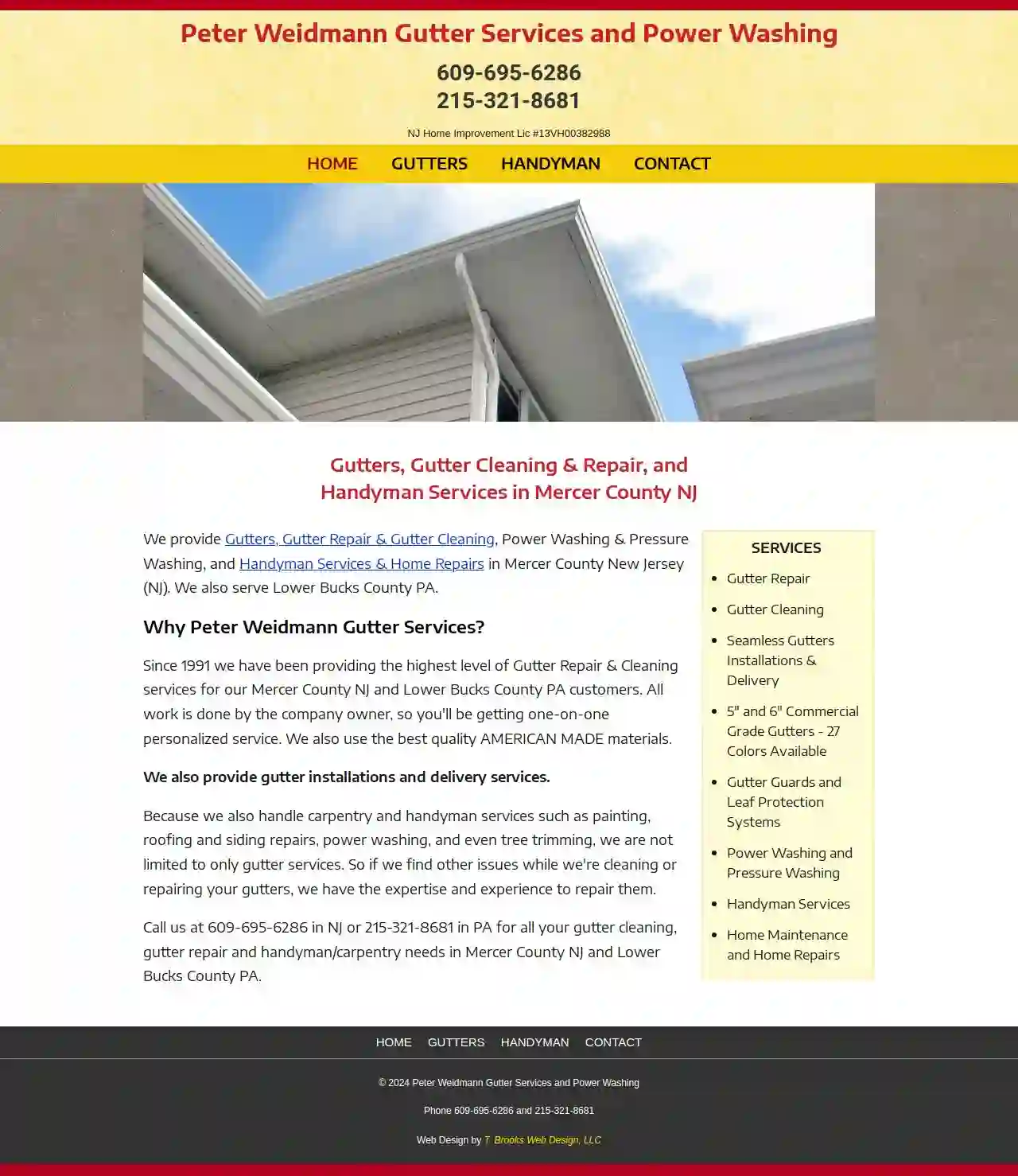Gutter Cleaning Garwood
Top Roof Gutter Cleaning in Garwood
Get 3 FREE Gutter Cleaning quotes for your project today! Compare profiles, reviews, accreditations, portfolio, etc... and choose the best deal.

Jackson Pressure Cleaning
591 reviewsJackson, USThank you for visiting Jackson Pressure Cleaning, where your satisfaction is our number 1 priority! With over 20 years of experience we are your premier pressure washing service provider. Jackson Pressure Cleaning services residential and commercial properties in Hillsborough, Pinellas, Pasco, and Hernando counties. In addition to pressure cleaning, we offer several other restoration services for your property beautification needs. See our list of services below and get a free quote today!
- Services
- Why Us?
- Our Team
- Testimonials
- Gallery
Get Quote
Garden State Gutter Cleaning
4.8303 reviews240 Montgomery Street, Bloomfield, 07003, USGarden State Gutter Cleaning, LLC is your trusted partner for all your gutter needs. We offer a comprehensive range of services, including gutter cleaning, repair, installation, and more. Our experienced team is dedicated to providing high-quality workmanship and exceptional customer service. We serve residential and commercial clients throughout New Jersey. Contact us today for a free estimate!
- Services
- Why Us?
- Gallery
Get Quote
AAA & C Gutters LLC
551 reviews149 E 17th St., Paterson, 07524, USAAA&C Gutters Cleaning is a locally owned and operated business with over 12 years of experience in the gutter cleaning industry. We are dedicated to providing top-quality service at affordable prices, ensuring customer satisfaction is our top priority. Our team of professionals is fully insured and committed to delivering exceptional results. We understand the importance of maintaining clean and functional gutters for your home, and we strive to exceed your expectations with our meticulous attention to detail and reliable service. We offer a wide range Our Services Gutter Installation Gutter Guard Deck Cleaning Dryer Vent Cleaning Gutter Repair Roof Cleaning Fence Vinyl Cleaning Siding Vinyl Cleaning Gutters Cleaning Chimney Cap Installation Walkway Cleaning We are committed to providing prompt and reliable service, and we are always available to answer any questions you may have. Contact us today for a free estimate!
- Services
- Why Us?
- Our Team
- Testimonials
- Gallery
Get Quote
Affordable & Professional Window & Gutter Cleaning Powerwashing Services
4.618 reviewsFreehold, NJ 07728, USWelcome to Affordable & Professional, where we specialize in top-notch power washing and gutter cleaning services in NJ. Our commitment to quality and attention to detail ensures that every part of your property, from your driveway and patio to your roof and balcony, receives the best care. With our expert team, we guarantee to transform and maintain the pristine condition of your property. Learn more about our power washing and pressure washing services in New Jersey, and give us a call to schedule an appointment.
- Services
- Why Us?
- Gallery
Get Quote
Middlesex Gutter Supply
4.9163 reviewsSuite 150, Princeton, NJ, 08540, 300 Carnegie Center Dr, USMiddlesex Gutter Supply has been providing high quality gutter services to customers for over forty years. From the moment our company was founded in 1979, we have dedicated ourselves to customer service. We provide our customers with high quality gutter services at an affordable rate that beats out the competition. Our passion for our work allows us to provide top-notch customer service, which includes same-day scheduling for our gutter services.
- Services
- Why Us?
- Gallery
Get Quote
Gutter Guys
4.513 reviewsJackson, USThe Gutter Guys is a full-service rain gutter company with over 500,000 happy customers that has been in business since 1988. We install, repair, and clean gutters, as well as provide gutter guards and trim and soffit repair and replacement services in Pennsylvania, New Jersey, Maryland, and Delaware.
- Services
- Why Us?
- Testimonials
- Gallery
Get Quote
Bohemia Window Cleaning
539 reviews121 Garabrant St, #515, 121 Garabrant St #515, Jersey City, 07304, USBohemia Window Cleaning is a New York and New Jersey based company with over 15 years of experience providing top-notch residential and commercial window cleaning services. We pride ourselves on our spotless reputation, competitive pricing, highly professional and trustworthy team, exceptional customer service, reliability, flexible scheduling, and a 100% satisfaction guarantee. Our comprehensive services include interior and exterior window cleaning, gutter cleaning, power washing, glass restoration, and tinting. We also offer pressure washing and full bucket track services. Our mission is to help people by providing the best possible service. We strive to exceed expectations and make your day brighter with sparkling clean windows.
- Services
- Why Us?
- Our Team
- Testimonials
- Gallery
Get Quote
New Jersey Window & Gutter cleaning LLC
511 reviewsJackson, USWelcome to NJ Window & Gutter Cleaning, where we make it easy to get a new kind of clean. We're a team of professionals dedicated to providing top-notch window cleaning, gutter cleaning, power washing, roof shampoo, deck sealing and painting services. With years of experience and a commitment to excellence, we're the perfect choice for all your cleaning needs. Contact us now to learn more about our services and let's make your project happen!
- Services
- Why Us?
- Gallery
Get Quote
D & D POWER WASHING AND GUTTER CLEANING
5103 reviewsSomerset, 08873, USD&D Power Washing and Gutter Cleaning is a local, family-owned and operated company serving Somerset, NJ. We are fully licensed, insured and OSHA certified. Our customers are our top priority and we are determined to provide services that go above and beyond your expectations at a great price. We use state of the art equipment, eco-friendly cleaning agents, and hot water (up to 200° F) for the highest quality results. We also use safe and low pressure washing techniques to ensure your property is cleaned effectively and without damage. We pride ourselves on our outstanding customer reviews and our commitment to exceeding your expectations.
- Services
- Why Us?
- Gallery
Get Quote
Peter Weidmann Gutter Services
3.514 reviewsMercer County, USPeter Weidmann Gutter Services and Power Washing has been providing the highest level of Gutter Repair & Cleaning services for our Mercer County NJ and Lower Bucks County PA customers since 1991. All work is done by the company owner, so you'll be getting one-on-one personalized service. We also use the best quality AMERICAN MADE materials. We provide Gutters, Gutter Repair & Gutter Cleaning, Power Washing & Pressure Washing, and Handyman Services & Home Repairs in Mercer County New Jersey (NJ). We also serve Lower Bucks County PA. Our services include Gutter Repair, Gutter Cleaning, Seamless Gutters Installations & Delivery, 5" and 6" Commercial Grade Gutters - 27 Colors Available, Gutter Guards and Leaf Protection Systems, Power Washing and Pressure Washing, Handyman Services, Home Maintenance and Home Repairs, Carpentry, Painting, Roofing, Siding, and Tree Trimming.
- Services
- Why Us?
- Accreditations
- Our Team
- Gallery
Get Quote
Over 60,241+ Janitorial Services registered
Our cleaning contractors operate in Garwood and surrounding areas!
CleaningMatch has curated and vetted Top Janitorial Services in Garwood. Find the most reliable contractor today.
Frequently Asked Questions About Gutter Cleaning
- Improper Ladder Placement: Placing a ladder incorrectly can damage shingles or gutters.
- Excessive Force: Using excessive force when removing debris can damage gutters or dislodge shingles.
- High-Pressure Washing: Using high-pressure washing on delicate roofing materials can cause damage.
- Visible Debris: You can see leaves, twigs, and other debris accumulated in your gutters from the ground.
- Sagging Gutters: Gutters that are filled with debris become heavy and can sag or pull away from the house.
- Water Overflowing: During rainfall, water spills over the sides of your gutters instead of flowing through the downspouts.
- Water Stains: Water stains on your siding or foundation indicate that your gutters are overflowing.
- Plant Growth: Plants or moss growing in your gutters indicate standing water and a lack of proper drainage.
- Reduced Leaks: Seamless gutters have fewer seams, reducing the likelihood of leaks developing over time.
- Improved Appearance: Seamless gutters create a more aesthetically pleasing and streamlined look along your roofline.
- Less Maintenance: Fewer seams mean less opportunity for debris to accumulate, reducing the frequency of cleaning needed.
- Foundation Problems: Clogged gutters can cause water to pool around your foundation, leading to cracks, leaks, and even structural damage.
- Basement Flooding: Overflowing gutters can lead to water seeping into your basement, causing flooding and damage to belongings.
- Roof Damage: Backed-up water in gutters can damage your roof, leading to leaks, rot, and costly repairs.
- Landscape Erosion: Water spilling over clogged gutters can erode your landscaping, damaging plants and creating unsightly trenches.
- Pest Infestations: Clogged gutters provide a breeding ground for mosquitoes, insects, and rodents, increasing the risk of infestations.
Can gutter cleaning damage my roof?
To minimize the risk of roof damage, choose a reputable gutter cleaning company with experienced and trained professionals who prioritize safety and use appropriate cleaning methods.
How do I know if my gutters need cleaning?
If you notice any of these signs, it's time to schedule a gutter cleaning.
What are seamless gutters, and are they better than sectional gutters?
Advantages of Seamless Gutters:
While seamless gutters offer advantages, sectional gutters are typically more affordable and easier to repair if a section becomes damaged. The best choice for your home depends on your budget, aesthetic preferences, and the length and complexity of your roofline.
Why is gutter cleaning important?
Regular gutter cleaning prevents these problems and helps maintain the integrity and value of your property.
Can gutter cleaning damage my roof?
- Improper Ladder Placement: Placing a ladder incorrectly can damage shingles or gutters.
- Excessive Force: Using excessive force when removing debris can damage gutters or dislodge shingles.
- High-Pressure Washing: Using high-pressure washing on delicate roofing materials can cause damage.
To minimize the risk of roof damage, choose a reputable gutter cleaning company with experienced and trained professionals who prioritize safety and use appropriate cleaning methods.
How do I know if my gutters need cleaning?
- Visible Debris: You can see leaves, twigs, and other debris accumulated in your gutters from the ground.
- Sagging Gutters: Gutters that are filled with debris become heavy and can sag or pull away from the house.
- Water Overflowing: During rainfall, water spills over the sides of your gutters instead of flowing through the downspouts.
- Water Stains: Water stains on your siding or foundation indicate that your gutters are overflowing.
- Plant Growth: Plants or moss growing in your gutters indicate standing water and a lack of proper drainage.
If you notice any of these signs, it's time to schedule a gutter cleaning.
What are seamless gutters, and are they better than sectional gutters?
Advantages of Seamless Gutters:
- Reduced Leaks: Seamless gutters have fewer seams, reducing the likelihood of leaks developing over time.
- Improved Appearance: Seamless gutters create a more aesthetically pleasing and streamlined look along your roofline.
- Less Maintenance: Fewer seams mean less opportunity for debris to accumulate, reducing the frequency of cleaning needed.
While seamless gutters offer advantages, sectional gutters are typically more affordable and easier to repair if a section becomes damaged. The best choice for your home depends on your budget, aesthetic preferences, and the length and complexity of your roofline.
Why is gutter cleaning important?
- Foundation Problems: Clogged gutters can cause water to pool around your foundation, leading to cracks, leaks, and even structural damage.
- Basement Flooding: Overflowing gutters can lead to water seeping into your basement, causing flooding and damage to belongings.
- Roof Damage: Backed-up water in gutters can damage your roof, leading to leaks, rot, and costly repairs.
- Landscape Erosion: Water spilling over clogged gutters can erode your landscaping, damaging plants and creating unsightly trenches.
- Pest Infestations: Clogged gutters provide a breeding ground for mosquitoes, insects, and rodents, increasing the risk of infestations.
Regular gutter cleaning prevents these problems and helps maintain the integrity and value of your property.